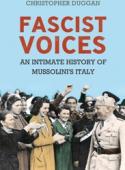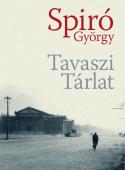

Przyznano prestiżowe nagrody historyczne Woolfson History Prize. Powędrowały do naszych autorów - Susan Brigden i Christophera Duggana. Zapraszamy do zamawiania książek laureatów do recenzji!
Described as “masterly” in the Literary Review, Susan’s Thomas Wyatt: The Heart’s Forest, published by Faber, is a biography of the first modern voice in English poetry. Known as 'Chieftain' of a 'new company of courtly makers', Thomas Wyatt brought the Italian poetic Renaissance to England, but he was also revered as prophet-poet of the Reformation.
Examining material from previously unseen archives, letters diaries, newspaper reports, radio broadcasts and popular songs, Christopher’s book Fascist Voices: An Intimate History of Mussolini’s Italy examines the rise of Fascist Italy. He looks at the extraordinarily personal and often intensely intimate character of the relationship that Mussolini had with millions of Italians, how he influenced politics, religion and everyday life to the extent that his legacy still lingers in modern Italy.
********
Osoby zainteresowane tytułami proszone są o kontakt z Agatą Żabowską pod adresem agata@literatura.com.pl

Szanowni wydawcy, informujemy o możliwości ubiegania się o granty translatorskie Instytutu Ramona Llulla na tłumaczenia z języka katalońskiego.
Jest jeszcze czas na aplikowanie. Szczegółu pod adresem: www.llull.cat/english/subvencions
Osoby zainteresowane katalońskojęzyczną ofertą ANAW-u (m.in.: Maite Carranza, David Cirici, Gisela Pou, Pau Joan Hernández, Gabriel Janer Manila), proszone są o kontakt z Agatą Żabowską pod adresem agata@literatura.com.pl

Zachęcamy do zamawiania egzemplarzy ostatniej powieści Györgyego Spiró - węgierskiego pisarza, znawcy polskiej kultury, którego głośna powieść "Iksowie" ukazała się w kwietniu br. nakładem W.A.B.
„Never before have we seen depicted with such force the horrible everyday life of the fifties, the breakdown and the compromises of the individual, and the process of a whole society giving up it’s integrity.”
“It’s not a bad idea for a man to get admitted to hospital a couple of days before a revolution breaks out, stay in until it’s been quashed and recuperate quietly at home during the ensuing purge.” These are the opening lines of György Spiró’s latest novel, Spring Collection, that presents the reader with a shocking picture of the 56 Hungarian Revolution. The main protagonist is an engineer by the name of Gyula Fátray who, like so many other qualified professionals at that time, is trying to get along first as a simple worker before the Second World War, and after it as a communist party member, an idealist, and leader of planning in a newly founded factory. Just days before mass protests begin in October, he is admitted to hospital for an operation for haemorrhoids. He returns home after the fighting to be faced by a Soviet-occupied Budapest.
This novel commemorates the unbearably absurd machinations of the dictatorial regime in which not even those innocent could feel safe. When Gyula’s name appears in a newspaper article alongside some conspirators against the state, he finds himself ostracised by his best friends and closest colleagues virtually overnight. It no longer seems to matter that he was in hospital for the duration of the revolution and that the charges are false. Just as in Kafka’s Trial, history marches mercilessly towards an excruciating outcome.
Gyula’s situation is made all the more difficult by the fact that his wife, Kati, a tough communist, seems not to understand a thing because she is so wrapped up in herself and her role in organising an art installation known as the Spring Collection.
This novel recalls the purges that came after 56 with touching authenticity. At the end, on May 1st of 1957 the whole nation, the majority of which had revolted against the system half a year earlier, submitted to the new communist leadership that did not understand that Hungary had been defeated for decades. Our hero’s life hangs by a single thread, and there is a special twist in the story that makes it possible for him to survive. The false charge and ensuing expulsion from society mark the beginning of the process which eventually led to the trial and execution of Imre Nagy. The impossibility of family life provides a dramatic parallel to the historical parody of a failed, conquered country and it is from this double story that one of György Spiró’s most exciting novels is born.
Rights sold:
(status on May 2013)
Spanish (Acantilado)
Catalan (Quaderns Crema)
Italian (Guanda)
Finnish (Avain)
German language (Nischen Verlag)
Slovak (Kalligram)
Bulgarian (Gutenberg Publishing)
Turkish (Dedalus Publishing)
GYÖRGY SPIRÓ was born in 1946 in Budapest. He is a writer, a dramatist and a translator and scholar of Polish literature. He is one of the most frequently played contemporary playwrights of Hungary.
*********************
Osoby zainteresowane tytułem oraz innymi dziełami G. Spiró prosimy o kontakt z Justyną Czechowską pod adresem justyna@literatura.com.pl
(dostępny maszynopis oraz inne materiały recenzenckie)

ANAW rozpoczyna współpracę z czołowym węgierskim wydawnictwem MAGVETŐ - wydawcą m.in.György'ego Spiró, który odwiedzi Polskę w dniach 14 - 17 maja.
Kontakt w sprawie materiałów recenzenckich:
Justyna Czechowska
justyna@literatura.com.pl
ABOUT MAGVETŐ PUBLISHING
Magvető: Publisher of the Year in 2003, 2006, 2010, 2011 and 2013
Magvető has become synonymous with sophisticated books and literature, and the publication of great moments of the culture of human language. In addition to the works of Hungary’s Nobel Prize winner, Imre Kertész, Magvető publishes great and influential writers such as Pál Závada, Péter Esterházy, György Spiró, Ádám Bodor, Zsuzsa Rakovszky, Lajos Parti Nagy, István Szilágyi, Ádám Nádasdy, László Krasznahorkai and László Bertók. Magvető also publishes the works of the next generation of great writers, including the poems and novels of László Darvasi, György Dragomán, Mari Falcsik, Noémi Kiss, Krisztián Grecsó, Zsolt Nagy Koppány, Virág Erdős, Gábor Vida, Tamás Jónás, Krisztina Tóth, Dániel Varró, Ferenc Barnás, Attila Bartis, Éva Bánki, Éva Berniczky, Anna Szabó T. Being published by Magvető is a prestigious honour for Hungarian authors. The works of contemporary writers such as Péter Esterházy, György Spiró, Pál Závada and Zsuzsa Rakovszky are regularly included in the top lists of many literary circles, and they sell tens of thousands of copies. Imre Kertész’ novel, Fateless, has sold more copies than any other book in recent Hungarian history.
As for Hungarian classics, we continue to publish the oeuvre series of Géza Csáth, Ottó Orbán, György Petri, Miklós Szentkuthy, Géza Ottlik, György Kardos G., Sándor Lénárd and Antal Szerb. Since the 1960s, we have published two annual compilations: Panorama (Körkép) and Fine Poetry (Szép versek) for the Book Week Festival, carefully editing into single volumes the best works of literature from the preceding year. We are reviving the annual compilation, Rivalda, that includes the best dramas of the year. We also publish remarkable essay collections from authors such as Péter György, András Nagy and György Poszler.
While our main profile is the publication of contemporary Hungarian poetry and prose, we could call Gabriel García Márquez, Frank McCourt, Cormac McCarthy, Thomas Pynchon, Michel Houellebecq, Lyudmila Ulitskaya, Anna Gavalda, Juan Marsé or Terézia Mora “resident authors”. In 2004 we began to publish classics of world literature in our White Crow Books – Magvető Classics series. These include the various works of Faulkner, Maupassant, Turgenev, Goethe, Lawrence, Stanisław Lem, Steinbeck, Chekhov, Dickens, Alain-Fournier, Heinrich Mann, Ajar, Flaubert, Nabokov, Dreiser. We believe that these works should be on the bookshelves of every well-informed family – however, they have long been unavailable in bookshops, sometimes even in second-hand ones.
We are especially proud of the numerous prestigious awards that our Authors and Group members have earned.
In 2002, Imre Kertész became the first Hungarian to be awarded the Nobel Prize for Literature. Magvető has published his works since the nineteen-nineties.
The prestigious annual Hungarian Literature Prize has been awarded to Magvető authors: Péter Esterházy in 2000, Ádám Bodor and István Szilágyi in 2001, Zsuzsa Rakovszky in 2002 and Lajos Parti Nagy in 2003. György Spiró received the Aegon Art Prize in 2006 (this award has replaced the annual Hungarian Literature Prize), and the Artisjus Literary Grand Prize in 2012. Krisztián Grecsó was awarded the the Aegon Art Prize in 2012.
A book by László Darvasi and Dániel Varró was awarded children’s book of the year. The Budapest Grand Prize was awarded to Imre Kertész in 1997. Several of our authors have been awarded the Kossuth Prize, the highest state level acknowledgement of achievement in Hungary, and other prestigious awards from the state for service to the arts.
Magvető became Publisher of the Year in 2003, 2006, and following many successful years as first runner up, in 2010, 2011 and 2013.

"SERVANTS" Lucy Lethbridge, znalazły się na liście "50 książek, które czyta świat" magazynu do czytania: "Książki". Zapraszamy do zamawiania materiałów recenzenckich!
“Hats off to Lethbridge, for so touchingly and comprehensively chronicling those lives that history, like the snootiest of employers, has neglected for so long”
Craig Brown, Mail on Sunday
No aspect of the twentieth-century home has spoken quite so eloquently to the traditional English idea of the ordered life as the keeping of servants. From the ostentatious luxury of the Edwardian rich to a middle-class housewife eking out a modest budget in order to keep a house-parlourmaid, the servant was the marker of social success.
Millions of unseen, unheard domestic staff toiled in kitchens, parlours and country houses at the turn of the century, stirring eggs so that the yolks would be perfectly centralised, ironing shoelaces and blacking grates. The average maid carried an estimated three tons of water up and down stairs every week.
The stories of below-stairs workers are the untold history of the last century, their fortunes a barometer of the twilight years of the landed estates, the development of new technologies, the changing place of both men and women and the radical changes in everyday life over the last 100 years. From the quintessential liveried servant of 1900 to the self-service of the 1970s, these are stories of aspirations, ideals, hope and disappointment across the classes.
Sweeping in its scope, extensively researched and brilliantly observed, this book offers a fresh and intimate insight into this invisible population, their voices coming off the page to tell us what their lives were really like. It is the most authoritative and comprehensive account yet of those who worked behind the scenes of twentieth century Britain.
BBC Meet the Author: Lucy Lethbridge on the life of servants
*******
W sprawie materiałów recenzenckich proszę kontaktowac się z Agatą Żabowską pod adresem agata@literatura.com.pl
